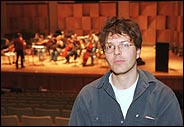kaleidoscope
Andy Creeggan: From Barenaked to Bartok
 Andy Creeggan
Andy Creeggan
PHOTO: OWEN EGAN | |
Why would a well-established musician, well on his way to pop stardom, come to the Faculty of Music to study composition?
He'll tell you it was because his girlfriend, now wife, wanted to leave Vancouver for Montreal to do her art therapy practicum at the Palliative Care Unit of the Royal Victoria Hospital.
He'll also tell you that he figured he could get into McGill because he'd been accepted at the faculty years ago, but decided to continue making and performing music rather than studying it.
Eventually, it will emerge that Andy Creeggan, former keyboard man and percussionist for the highly successful Barenaked Ladies, had a yearning to know more than the pop and jazz music that had so influenced him as a high school musician growing up in Scarborough, Ontario.
Furthermore, as tempting as it was to stay with the Ladies, Creeggan was uncomfortable with the fast fame. "Your world gets huge all of a sudden and for someone who never really desired that, it was unnerving sometimes.
"I wanted space for my music, my personality, and I'd never been to school," continues the 28-year-old Creeggan. "I was afraid I'd be boxed in staying with the Ladies. I was also very interested in instrumental music."
So now, alongside Jaco Pastorias, "the great bass-player with Weather Report (a '70s jazz band)," and the likes of Duke Ellington, Miles Davis and Oscar Peterson, the composers Creeggan will tell you he most admires include Bela Bartok, Maurice Ravel and Claude Debussy. Interestingly enough, all three latter composers borrowed from various genres including jazz and folk music. They were also playful.
And these are elements you find in the music Creeggan has composed and recorded for the past 10 years, usually with his brother Jim. Hence the name of their group, The Brothers Creeggan.
Take "Sleep Suite," for instance, which leads Creeggan's 1997 recording "Andiwork." It begins with an approaching gallop on the gboba drum, then moves into a melodic piano improvisation on the theme of "Danny Boy" before easing into the more upbeat "Can't Help Lovin' Dat Man."
The second movement, a three-voice a capella song in a minor key, between Andy, Jim and Andy's wife, Natacha Hébert, is positively cathedral-like in its ethereal meanderings. The Creeggan brothers aren't newcomers to a capella — their first musical claim to fame was as part of the Synthetics, an a capella quartet that won the National Rising Star talent contest at the Canadian National Exhibition in 1987, beating out a 13-year-old Alanis Morissette!
While the suite would probably be classified as "buffet" — or unclassifiable — music, "Grade 13," which follows, is an entirely uncomplicated and humorous ragtime on piano. That's what seems to characterize Creeggan's work: the playful juxtaposition of genres.
That, of course, makes it hard to classify the brothers' CDs and most of their sales are by word-of-mouth and at performances. The brothers' latest CD, however, "Trunks" represents something of a departure.
"Our first two albums were sometimes hard to listen to because they moved around so much as far as style and mood goes. I think we were trying to work on becoming more coherent from beginning to end and trying to find that right balance between the two approaches," says Creeggan. The Toronto Sun called "Trunks" "a delicate and sweet-sounding effort that combines the best of folk and jazz."
Still, don't expect too much homogeneity. Creeggan's now putting together a second Andiwork CD which will include excerpts of recording sessions he's had with professional and student musicians. "What makes these excerpts interesting is that all the music is improvised by classically trained musicians based on directives I give before each take. The music achieves a special subtlety as a result of sensitive players orchestrating themselves," writes Creeggan in his discography. The album will include "Prelude and Lullabies," Creeggan's piece for his composition class recently premiered at Pollack Hall.
Brian Cherney, Creeggan's composition teacher, appreciates the "freshness" his student brings to composing and believes he has "learned a lot regarding the so-called classical side of things.
"He's learned certain techniques and approaches which fit into his own approach," says Cherney, adding that Creeggan is also very "enjoyable to work with."
Creeggan, either on his own, or as one of the Brothers Creeggan, is a name worth listening for; his sound isn't likely to leave listeners indifferent. You can tune into the B.C. web site (www.brotherscreeggan.com) to sample selections from "Trunks." For another quick sampling of Creeggan's work, tune into the Royal Canadian Air Farce on Friday night — the theme song is by Creeggan.
 |
||||
|
Don't bother patenting anything; just be in a damn hurry to get your invention on the market. |
||||
Lifestyles of the rich and tenured

| |
Each day, new technology companies create instant millionaires as the firms rake in piles of dough from initial public offerings of their stock. Many of the resulting nouveau riche are science and engineering professors who took their ideas to market.
At Stanford University, for instance, an estimated one-third of the professors in the computer science department are millionaires.
Despite having money to burn, many are staying put in academe.
MIT electrical engineering and computer science professor David Gifford founded one of the first e-commerce companies and made a fortune.
"The great thing about universities is there is an awful lot of freedom to be completely and totally honest with yourself and everybody else about the limitations of your work, and that's the only way you can do science," says Gifford. Of the world of business, he says, "There's always pressure to embellish."
"Most of those who've been very successful financially don't want it to alter their relationship to their colleagues. They want to be valued for their academic contributions, and they don't want to be thought of as fat cats," says John Guttag, head of Gifford's department.
While some newly rich professors admit they've added a little Armani to their wardrobes for meetings with investors, they generally wear khakis to campus.
"I don't think there's a lot of awareness among faculty of which of our colleagues are wealthy and which aren't," says Stanford linguistics and philosophy professor Thomas Wasow.
But development officers are quick to take an interest in newly wealthy academics. And deans often become friendlier.
"Instead of having normal relationships with your dean and departmental chair, all of a sudden you have a more bilateral relationship," says Berkeley computer science professor Michael Harrison, a multimedia designer who struck it rich.
Source: The Chronicle of Higher Education
 |
||||
|
If Paul Martin could become the leader any time soon, all kinds of Ontario right-wing voters would stay with the Liberals. |
||||
Paying your patients

| |
Want to keep homeless people healthy? Try paying them.
That's the conclusion reached by a team of researchers who studied 118 homeless adults in San Francisco at high risk for developing active tuberculosis.
The study's subjects had all been exposed to TB, a major health problem among the homeless. But they didn't yet have TB in its active and contagious form. Preventive antiobiotic treatments would keep them healthy, but first, they had to actually turn up to take the drugs.
In cases where homeless TB patients were offered five dollars to show up for each treatment, they turned up for their treatments at almost double the rate of other TB patients who weren't offered cash.
An approach that didn't work well in motivating these individuals to accept treatment was the use of peer health advisors — other homeless adults trained to encourage their counterparts to seek medical help.
The homeless subjects "were bothered by anybody trying to tell them what to do with their life," even if the advisors were "buddies," says McGill medicine professor Louise Pilote, who collaborated on the study with colleagues from the University of California at San Francisco and Stanford.
"Cash incentives haven't been studied much" as inducements for accepting treatment, says Pilote. "Some people think this type of approach is unethical — the money might be used for drugs or alcohol.
"But this was a very small incentive — it amounted to $10 a week for two treatments. When you think about the potential impact of TB on this population, I think the approach can be justified."
Still, Pilote is doubtful that any city's health authorities will try the approach anytime soon.
"It's a very sensitive issue to pay people to accept health care."
The study was recently published in the Archives of Internal Medicine.

